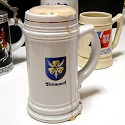
Preliminary Report by the Chief of Staff of the Seekriegsleitung (Vizeadmiral Fricke) on the Conference with the Führer on 22 January 1942.
I. Norway:
1. Latest reports have thoroughly convinced the Führer that Britain and the United States intend to make every effort to influence the course of the war by an attack on northern Norway.
Several places along the coast from Trondheim to Kirkenes will probably be occupied shortly.
Sweden's support in a spring offensive is expected, for which she would receive Narvik and ore deposits near Petsamo.
Finland would be guaranteed her independence within the old borders.
The Führer has proof of Sweden's willingness to participate and therefore plans the following:
b. To appoint Field Marshal von Kesselring as Commander of the Armed Forces in Norway.
The Führer is convinced that Norway is the "zone of destiny" in this war.
Therefore he demands unconditional obedience to all his commands and wishes concerning the defense of this area.
2. The Führer ordered a considerable reinforcement of Army personnel and materiel in Norway.
The Commander in Chief, Luftwaffe, was instructed to strengthen his forces.
The latter anticipates certain difficulties: he is short of planes; reconnaissance and fighting are limited in bad weather; besides, the Norwegian air fields are inconveniently located and are all too few.
The Führer desires that the Navy must also do everything in its power to head off the British offensive at the very start.
The Navy must take over adequate reconnaissance in weather not fit for flying.
It must defend the sea lanes to Norway, and must dislodge with all available forces any enemy troops which have landed, entirely foregoing all other warfare "except for the Mediterranean operations".
3. The Führer demands that all measures be instituted at once since the danger is imminent.
He agrees, however, to let Brest Group complete its mission, using all light defense forces.
The S-boats are to remain in the Channel.
On completion of the mission the Führer would like to have all vessels in Norway.
The Führer requires that S-boats operate in the Norwegian area.
He agrees with the proposal to transfer a S-boat flotilla to Norway by about the second half of February.
The S-boats in the Black Sea will remain.
He demands transfer of all submarines to Norway for reconnaissance against the approaching enemy.
This order can be revised to correspond with the scarcity of available bases.
If we transfer submarine training bases, which will probably be necessary in any case on account of ice conditions, it would relieve the operational submarines.
The Führer is very happy about the fact that submarines are already operating between Iceland and Scotland.
Those positions would therefore have to remain occupied and it would be necessary to coordinate them more closely with the Norway problem.
The Führer demands that every available vessel be employed in Norway.
He endorses our plans to use battleships, pocket battleships, heavy cruisers, light naval forces and S-boats; increases his demand for submarines; is of the same opinion as the Seekriegsleitung concerning the improbability of a landing in western France.
The Führer demands investigation of the possibility of using light cruisers, auxiliary cruisers and an increased number of auxiliary vessels fit for reconnaissance in Norwegian waters.
4. The Führer orders even more of the heaviest artillery pieces to be mounted in Norway.
He demands that all heavy caliber guns available be tested and made ready (reserve barrels of the old battleships, captured French barrels, 25 to 30.5 barrels in Swinemünde, etc.).
5. It will be necessary to investigate further the possibility of bringing in supplies by submarine.
6. The Führer emphasized several times that the greatest speed and efficiency are vitally important.
He is deeply concerned about the grave consequences which unfavorable developments in the North Norwegian area could have on the entire course of the war.
II. The Führer had no comments to make on the oil problem which I presented as being very serious, especially in view of the planned operations.
III. The Terboven affair is settled in our favor.
A corresponding decision in written form will be forwarded to the Seekriegsleitung and to the Reich Commissioner.
|
 BOOK: The Battleship Bismarck. The Complete History of the Ship.
 Naval & military gifts
|
